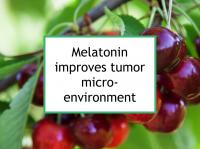Melatonin is a hormone known primarily for its involvement in the regulation of circadian rhythms (the body clock). However, melatonin has been reported to have chemopreventive activities in both hormone receptor positive (ER+/PR+) and hormone receptor negative (ER-/PR-) disease breast cancer cells.
For example, in one study, melatonin reduced tumor growth, proliferation, and angiogenesis in an animal model of triple negative (ER-/PR-/HER2-) breast cancer. Now a new study has demonstrated that melatonin is effective in regulating angiogenic and inflammatory proteins that contribute to triple negative tumor progression.
Melatonin and the tumor microenvironment
The tumor microenvironment includes noncancerous cells and proteins present both within the tumor and surrounding it. The microenvironment typically contains immune cells, blood vessel cells and fibroblasts (a type of connective tissue cell), as well as the proteins produced by these cells and the tumor itself. Far from being an isolated or encapsulated ball of cancer cells that is attempting to hide from the immune system, the typical breast tumor helps generate a microenvironment that can subvert the body's defenses.
For example, immune cells that arrive at the site may have their anti-cancer functions compromised in response to tumor-derived signals—sometimes such functions are actually co-opted to promote tumor growth.
Fibroblasts, which produce collagen and other fibers, maintain the structural integrity of connective tissues. Accumulations of fibroblasts around breast cancer cells provide structural and biochemical support for breast cancer. Melatonin has been shown to influence multiple components of the tumor microenvironment, resulting in an inhospitable environment for tumor progression. For example, melatonin has been shown to inhibit estrogen production in breast adipose fibroblasts and alter their interaction with malignant breast cells.
Latest research demonstrates that melatonin reduces angiogenesis
The study referenced at the beginning of this news story was designed to investigate the influence of melatonin on MDA-MB-231 triple negative breast cancer cell viability, angiogenesis ad inflammation, especially when co-cultured with cancer-associated fibroblasts (CAFs). CAFs are cells residing in the tumor microenvironment that promote tumor growth, angiogenesis, inflammation, and metastasis, in part by secreting growth factors. Melatonin has been found to play role in preventing breast cancer development and also participate in reducing the synthesis of CAFs and endothelial cells in breast cancer.
Treatment with melatonin for 48 hours was found to reduce the viability of triple negative cells, CAFs and co-culture. When a monoculture of tumor cells only was compared to co-culture of CAFs, the authors found evidence of regulation of proteins involved with angiogenesis and inflammation. Treatment with melatonin was also found to result in altered expression of angiogenic and inflammatory proteins in both monoculture and co-culture of tumor cells and CAFs.
The authors comment that the study results confirm that CAFs increase the malignancy of a tumor. Furthermore, melatonin is effective in regulating angiogenic and inflammatory proteins that contribute to tumor progression, both in monoculture and co-culture with CAFs.
